Feminism and Disney: They’re Not As Different As You Might Think
Countless articles across the web claim that Disney is the enemy to all feminism, especially in its earlier years. Studies report that girls growing up with these movies end up having low self-esteem and are forced into gender norms. However, these people are looking at Disney in all the wrong ways. Countless princesses have shown their heroism, courage, and perseverance while still being kind, gentle, and loving; and isn’t that what feminism is really about? Here’s a few examples of disney princesses that are, despite popular belief, the kind of women you can look up to and learn from, even in this modern age.
Snow White
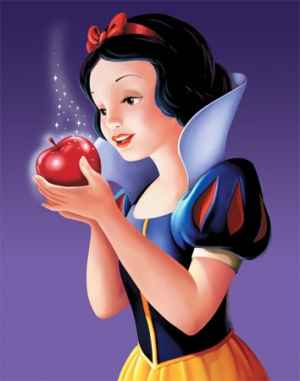
Isn’t Snow White the absolute worst example of feminism? Isn’t she the very epitome of why people are so mad at Disney’s portrayal of women? Her singing voice is super annoying, not to mention she lives with seven men and just gives herself away to the first person that comes waltzing through the forest and kisses her. Creepy and weird, right? That’s not quite the case.
First of all, Snow White is 14 years old in this film. 14! Her father and mother are dead, leaving her with a stepmother who undoubtedly put her through tons of abuse since she’s so obsessed with the fact that her magic mirror thinks Snow White is more beautiful than she. Despite this, Snow White is happy. She goes through her days singing and enjoying the wishing well, and overall not letting her stepmother’s words get into her head. If that doesn’t take strength, I don’t know what does.
Next, her stepmother tries to have her killed by a huntsman and even asks for her heart as proof that the deed has been done. The huntsman is sane, and of course realizes how messed up it is to kill a 14 year old girl for being too pretty, and lets her go. This is the point in the movie most people laugh and make fun of, Snow White running through the forest, screaming at everything, flailing her arms, and just overall making a fool of herself. However, put yourself in her shoes for a moment. Wouldn’t you be scared out of your mind? Suddenly you find out your stepmother is trying to kill you. You have no family, no friends, no where to turn. You have no idea what you’re going to do or how you’re going to survive. Of course she’s freaked out. Of course she jumps at every animal she sees, who knows if her stepmother is chasing her as she tries to make her escape?
Suddenly, she comes across a cottage. It looks nice and cozy. Maybe she’s a bit too trusting, but she goes inside and takes a little nap. She’s just been through a very traumatic experience, no doubt she’s exhausted. And when the dwarves come home and find her there, they’re stunned. They’re not sure what to do. If most women woke up with seven guys looking over them, they’d freak out. And if someone had just tried to have them killed, they’d be skeptical of everyone. But not Snow White. She understands that there’s still good in the world and decides to trust these strangers. And of course they take care of her, she’s 14! She needs some watching over, and a roof over her head. They’re not horrible people.
So, maybe Snow White was a little innocent, but weren’t we all at 14? If we were in her shoes, what would we have done? Not many people could have kept themselves so composed, let alone trust strangers to help them out, but she did so with a loving attitude, not to mention courage and compassion.
Cinderella
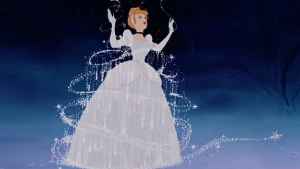
Cinderella is another phenomenal example of feminism. Again, she went through years and years of cruelty from her only family, her stepmother and stepsisters. And yet, she did everything with the utmost compassion and love. She realized that even though her family treated her awfully, they were still her family. Isn’t that what we all strive to be? Compassionate and loving despite what the world throws at us?
She’s a very hard worker. She makes breakfast, serves it to her family, feeds the farm animals, cleans the house, does the laundry, and somehow still has time to take care of herself every day. And she does so with a smile. If you were in her shoes, wouldn’t you be exhausted every day? Wouldn’t you want to give up and stay in bed every morning? Not Cinderella. She’s determined to give everything her all, and do her best every day. Not to mention she can carry a tray of food in both hands and balance one on her head. That takes serious skill.
Cinderella’s only wish is to go to the ball. Not for girlish fancies that we might wish for, dancing and boys and beautiful dresses. No, all she wanted was a night off. A night to be whoever she wanted to be. A night away from the housework and the tyranny of her family. With the help of her fairy-godmother, she’s able to do just that, with a little extra thrown in. And anyone that says it’s not incredibly hard to run down stairs in heels has obviously never tried, and yet Cinderella does so with grace.
Even when she gets back from the ball, Cinderella doesn’t cry over her would-be prince. She accepts reality for what it is. She understands she will never be a princess, and she most certainly doesn’t expect the prince to search the entire kingdom for her. She’s ready to go back to her mundane, normal life. She’s had her fun, and it was everything she could have dreamed it to be, it was time to get back to work.
When the prince does come, she’s pleasantly surprised. Swept off her feet, even. Who wouldn’t be? After all, he did scour the whole kingdom for her, which would be no easy feat. She realizes that he is truly in love with her, to put this much effort into finding her. So she let’s herself get excited. She lets herself acknowledge that maybe, just maybe, she wouldn’t mind living in a palace with this man that’s willing to look everywhere for her. She understands what she’s worth, and she realizes that maybe he does too. If the prince really didn’t love her, he would have kicked her out of the palace as soon as he realized she was a servant. But no, he welcomes her with open arms and marries her.
Ariel
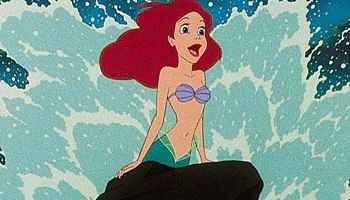
Ariel is curious. She’s not afraid to go explore new things. She fights a shark for pete’s sake! She’s not afraid of the unknown, she embraces it. When her father tries to stifle this love for another world, she doesn’t do as she’s told, instead she dives deeper. She’s willing to make choices she knows are best for her, not anyone else. Most people would never have the courage to leave their whole life, their entire family, everything they’ve ever known behind to jump head first into something they’re passionate about, and yet, Ariel does this without ever looking back.
While in the human world, Ariel’s not afraid to be herself. In this new place where she has to get a guy to kiss her in just three days if she wants to stay, she doesn’t rely on charms or good looks or flirtatiousness to get her what she wants. Instead she decides to enjoy the journey as her unapologetic self. She combs her hair with a dinglehopper and she blows bubbles in the bathtub. She doesn’t try to hide her excitement as Eric takes her out into town and shows her all these wondrous things she’s only dreamed about.
Think about when Eric lets her drive the carriage. She could have easily declined, thought that since she had no idea what she was doing, maybe she should just let Eric handle the horses. But the thought of trying something new was too tempting, and so she grabs the reigns and goes full throttle, almost throwing them out of the carriage. She could have been embarrassed and stopped, but no. She was determined to get this right. And so she carries on, without a care in the world.
And when her whole plan blows up in her face? She stands up to it. She’s willing to right the wrong she knows she’s caused. Facing a giant sea creature that’s pinky is bigger than you would be terrifying. But she does it, because she knows it’s what has to be done.
Belle

Belle wants much more than her provincial life, and she’s not afraid to be a little different. Every other girl goes swooning after Gaston, but not Belle. No, she’s got more important things ahead of her. She knows she’s destined for something great, she’s just not sure what that is exactly.
Belle could have easily let the townspeople deter her from who she really was. How easy would it have been for her to give in to social norms and become like every other girl in town? But no. Not Belle. She continued to be unapologetically herself, despite the town always gossiping about how strange she was and what a pity it was that such a beautiful face was going to waste.
She knows exactly what to say to encourage people. When her father is discouraged, she always knows exactly what to say in order to cheer him up and keep him focused on his dream. Without her constant assurances, he would have given up on inventing a long time ago. However, Belle believed in him, and that was all he needed to keep going.
Suddenly, her father gets captured by a hideous beast, and Belle doesn’t even hesitate to give up everything to save him. All of her hopes and dreams for herself, everything that she had been aspiring to be, gone in a matter of seconds. What mental and emotional strength that would have taken. What love she must feel for her father to do such a thing for him. She had no idea what the Beast was going to do to her, honestly, he could have done anything he wanted. He was much bigger and stronger than she, and yet she didn’t let that deter her from her choice. This would have taken more courage and love than most people could muster.
When she tries to run away from the castle and gets attacked by wolves, Belle doesn’t just sit and accept her fate, she fights back. She grabs a tree branch and tries swinging it, deterring the wolves from getting closer. When the Beast saves her, she realizes how wrong she’s been about this man. She could have easily left the Beast to die and went back to her father, but instead she takes him back to the castle and nurses him back to health. At this time, we get a chance to see her determination and stubbornness as they bicker about who’s fault it is that he got hurt (which she wins, by the way).
One of Belle’s strongest characteristics is her ability to see the good in others. She knows there’s good in the Beast, she’s just not quite sure how to get it out. And when she does, he becomes as kindhearted as she. The whole castle had been trying for years and years to make the Beast remember how to be kind and have basic human emotions, but they never succeeded. And suddenly, here comes this random girl that changes him 180 in a matter of months.
Jasmine
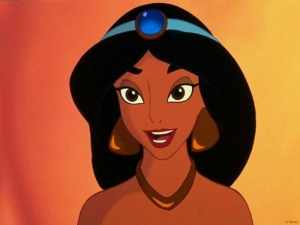
First of all, Aladdin is simply adorable. And yes, when he first sees Jasmine, he’s completely stricken by her good looks. But what really makes him fall for her is all of her other remarkable traits. She’s quick-witted with the apple-seller, athletic and talented when it comes to hopping buildings, and easy to talk to. She can keep up with him, which would be no easy feat.
When Aladdin gets to the palace, he realizes even more just how great Jasmine is. She’s independent, stubborn, and knows exactly what she’s worth, all shown in the quote, “How dare you? All of you? Standing around talking about my future? I am not a prize to be won!”
When Jafar takes over and she finds out her beloved Prince Ali is actually the street rat from the marketplace, she’s not angry, only confused. She doesn’t let this revelation deter her from her feelings towards her prince. She knows his true character, and is able to see past everything standing in front of that, trying to block who he really is.
Once Jafar basically takes her in as a slave, she fights as best she can against him. It’s obvious she’s disgusted by him, she makes it clear what her feelings are. She stands up for her father and does her best to do what she can against Jafar despite her circumstance. And then she sees Aladdin, ready to make a rescue. And with this sense of hope, she knows what she has to do. She uses her beauty to her advantage, and isn’t afraid to do what’s right for the overall good of everyone, including kiss an ugly old man. That takes guts.
Rapunzel
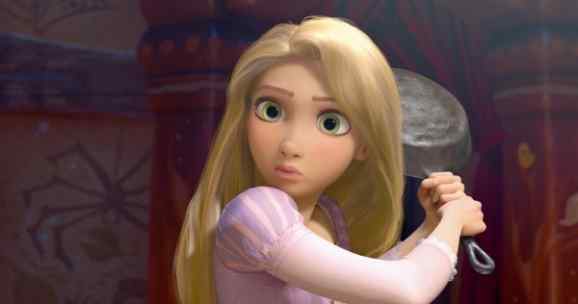
Rapunzel is arguably the most underrated disney princess of all time. She’s kind, funny, smart, and ready for anything. Sure she’s a little ditsy, a little clumsy, maybe even a little jumpy at times, but aren’t all girls? She’s incredibly strong, lifting things, including herself, with her own hair. She uses her hair to her advantage, even figuring out how to use it like Indiana Jones’s trusty whip. She knows her dream, and she’s willing to do anything to catch it.
Rapunzel has the most courage I’ve ever seen from a disney princess. She jumps from cliff to cliff. She faces off against at least 50 pub thugs. She hits an intruder in the head with a frying pan. And, in the end, she’s willing to stand up to, and even fight against, the one person she’s ever known, the one person she thought loved her. The woman she thought was protecting her.
She literally embodies everything that’s good in the world. She’s the King and Queen’s light, the sun in their sky, without her, they’re lost. They do the best they can, the only thing they can think of, to find her, but ultimately it’s up to Rapunzel to make her way back home.
Throughout the movie, it’s evident that without Rapunzel, Flynn would be lost. He’s not truly happy, it’s all a show. He pretends to be cocky and full of himself to hide the fact that he’s incredibly lonely and insecure. No one would ever have been able to get that out of him except Rapunzel. She has a natural ability to connect with people and make them feel safe and loved. She truly cares about everyone she comes in contact with, wants to learn everything there is to learn about absolutely everything in the world, and that draws people to her. It entices them to tell her their story. And she’s willing to listen with open ears and an open heart, always accepting people for who they truly are.
Princesses are Feminists
Disney is doing it right. They’re showing real girls acting as girls do. Many girls see themselves in these characters and look up to them highly. Let’s not make them feel horrible by saying these strong, compassionate, beautiful women are nothing but wimpy, ‘I’ll let the prince come save me’ little girls. Instead, let’s praise them for their admirable qualities and stop looking for the bad in Disney princesses.
What do you think? Leave a comment.
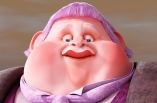
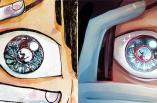
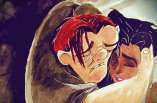

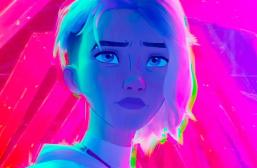
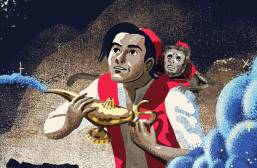
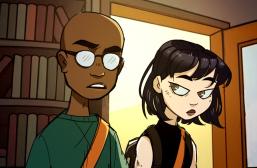
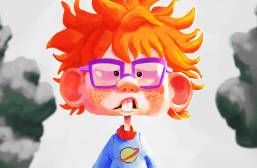
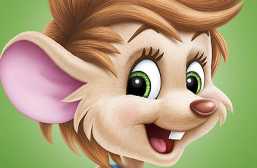
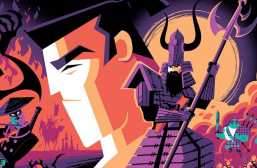
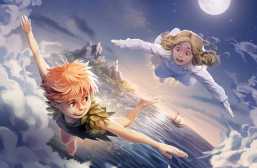
An issue with Ariel is that she spends literally the entire movie and thus most of her life going to extreme measures to become something she’s not. She doesn’t just want new surroundings, she wants a whole new body. She isn’t satisfied with who she is and what she is, and she’s willing to do anything to change it. She doesn’t think Eric will love her for who she is (a mermaid). What part of that message is good for little girls!? While it’s not specifically an issue of feminism, certainly many of these things contribute to the overall perception of woman in the world and what our values are.
Interesting. I have seen this film many times and if you can point to one moment where she says something along the lines of “I wish I were someone different” I will concede that you are correct. However, you will find that most of her wanting something “more” has to do with her world and not herself. In fact, we see her undergo a huge transformation of location and body and her core essence remains the same. She never really changes herself. She wants more though. She wants to expand her horizons. Is it wrong for women to want more?
The Little Mermaid is sometimes referred to as a Trans woman’s story:
Ariel spend her entire life trying to become the person she knows she is inside, and would like her outside to reflect her inside.
Thats putting it very very simply, but ya – that is exactly what some people experience in transition.
Mulan has a ton of interesting male figures, some principled strong men, some weak men, some strong men who act selfishly.
That would be a really great article too! Men being free to not just be a dashing prince, but whoever they want to be! That’s a great point!
Great article – I love these films.
Thank you for going deliberately against the common perception of Disney princess films. It’s certainly rare to hear compliments for old Disney films when it comes to the depiction of feminism. Everyone raves about Anna and Elsa, of course, but I’m glad you explored older characters and stories people often now put down as anti-feminist. Of course I can’t ignore the deep flaws that do exist in these films, reflecting a lot of the problems (or at least the norms) in societal thinking at the time of their creation – but I’m pleased something like this exists.
I agree – great article and examples!
I absolutely love this! I’ve always thought Disney princesses were perfect role models for little girls, and even myself! I can’t believe it took so long to have a beautiful article like this! Thank you for sharing!!
Mulan has always been my favorite princess. Sadly my niece has seen all of the other princess movies but her parents wont’ show her Mulan because of the violence. As a result she can’t wait “to be married” as she perceives it as the only way to escape problems and live happily. When I point out I’m happy and I’m single…it doesn’t hold a candle to all those princesses. Hopefully brave will become her new favorite movie if her parents will finally let her go watch it.
I think people are overrating Belle’s intelligence. Yes, she read books but her favorite book was a fairy tale about a Prince Charming. Doesn’t scream intelligence to me. She could be reading trashy books with no depth or meaning and lacking a decent message for all we know.
It is rather nice to see Disney *slowly* evolving to show stronger, more independent women. I’d love to see a transexual/transgender Princess — and I choose to believe that some day that will happen. I can’t wait!
That’s transvestism.
Feminism should mean that all women has the opportunities that men have, which also means that if you fall in love and you want to be with that person over anything else, you should be able to do it.
I agree, but society likes to distort this message by declaring every choice a woman makes automatically empowers her. Ariel made foolish decisions to abandon her family, friends, and entire world for an attractive stranger, but she did so as a teenager, not a woman.
Ariel has not other motivation past mid-way through the first act than winning the affections of a man she has only seen once and never spoken too. It motivates all her actions and frames her independence from father, another domineering male. All of it is potentially thwarted by another woman, who wants to make her purity and beauty hers by making her a slave. Aurora looks like Gloria Steinem compared to that.
I do enjoy your optimistic outlook on the subject. I find it refreshing that people are willing to look at something from such a perspective in spite of popular opinions.
I find Hayao Miyazaki’s princesses much more appealing feminists and better role models for modern young girls. I really love the personalities and courage embodied by the princesses of “Nausicaä of the Valley of the Wind ” and “Princess Mononoke”.
Mulan is my forever favorite disney girl (she’s not a princess) then there is Belle (she become a princess because of marriage).
MULAN FOR THE WIN, DAWG!!
She kills almost the entire Mongolian army with one rocket and some snow. Plus, dude comes back to win HER favor.
Very nice piece. It’s my favorite one I’ve read in a while.
I always have a soft spot for Belle. Even smart gals sometimes fall for the wrong man, and I dunno, if your sick old father is imprisioned by someone but you can take their place to save them… is that really anti-feminist? Even if it is, if someone was imprisioning my dad and denying him access to his diabetes meds, and I could take his place and know that I would survive the imprisonment when he wouldn’t, I would probably do it because i love my dad.
Though in all honesty, if I was in that situation, I would have just cozied up to Gaston and his hunting rifles and implied that you know, I’d really appreciate if he helped me rescue my dad. I’m sure he’d have helped, even if if only to feed his ego and get in my pants. Then I would have just, you know, not married him afterwords, but made sure the town gave him a big shiny medal and lots of recognition for ridding the forest of an evil beast.
But I guess that doesn’t give the beast a chance at redemption. But at that point, really, who cares?
Yeah, I sing the praises of Belle too. I think she’s fantastic. She’s brave (she goes looking for her Dad, volunteers to swap with him, stands up to the Beast, stands up to Gaston and the village to defend the Beast), she’s smart (with her nose stuck in a book!), she reads (rather than just looking pretty and waiting for a bloke to notice her)…
I argue that Disney’s feminist themes have improved over the course of the years. I’m surprised by the omissions of Frozen and Mulan, even though I realize that Mulan doesn’t feature a princess.
I definitely agree that Frozen and Mulan both have really great feminist characters, I was just hoping to explore princesses that most people look down upon. Tiana from Princess and the Frog is another great example of female empowerment in Disney!
Belle deserves a little more credit. After all, she’s the Disney princess who complains about her “dull, provincial” hometown and is totally unmoved by Gaston, who, let’s face it, is a hottie.
I really like your argument! I think that Disney is given too much flack in regards to women. I like your assessment that a lot of the Disney princesses are actually very strong women who can be good role models for young girls. You don’t have to be a kick-butt assassin like Black Widow to be a strong female character.
I like this as character study but feel like it’s not relevant to feminism? You’re generally arguing that they’re good characters/people. Like, Cinderella suffers abuse but stays because she’s goodhearted. This can be perceived as strength, but I feel like within the realm of feminism it’s more of fulfilling a woman’s classic role (doesn’t get angry, serves family)…. I guess I think you should have addressed the specific aspects of feminism you were referring to for each princess. Because a flattering depiction of a female isn’t the equivalent of feminism.
Also, maybe define what you believe to be feminist, because it’s extremely varied (the objectification/sexual-for-self debate, for example).
(This isn’t for all the examples you gave, just a general thing)
Thanks for the positive article, though. Lots of feminism today dismisses these ladies without really considering them or the times they lived in.
I really love this idea! Your article seems the perfect introduction into re-examining Disney princesses, rather than just dismissing them as is so often the case. I reckon that other people, having read this, will dig deeper into the subject. One thing that bothers me about the dismissal of Disney films (and princesses) is that the people dismissing are always boiling them down in neat, simple terms (the films are anti-feminist, have racist/sexist stereotypes, etc.). Yes, they could very well be thought of in those terms and feature those elements, but they are also packed with 50 other elements and viewpoints that should be thought through!
I’m as feminist as they come-grew up watching all of these films, played with Barbies, etc. I think a large misconception about feminism in general is the idea that there’s only one way to express femininity. If anything, these movies, in particular Beauty and the Beast for me, are a prime example of expressing gender normative femininity while also spreading the message that these are not toxic roles.
I have learned to be careful when using the word ‘all’, so not all of the Disney princesses are poor examples of girrl power. It is just that Cinderella doesn’t fit in feminism, however one sees it. You’re describing her as hardworking, and that she is, but doesn’t she also lack a revolutionary spirit, or at least some need for change and not just a night of. To me she appears as too passive or even masochistic…She being accepting might actually be her being apathetic…
Absolutely the Disney princesses are feminists, though they personify different versions of feminism.
I absolutely love what was said about Cinderella; I’ve been saying it for years. Critics say she “does nothing and just waits around for a prince,” but one, she does *everything* she’s ordered to do. She takes on the role of a servant, one that as a gentleman’s daughter, she should never have endured. As for waiting around for a prince, that’s flawed, too. As the author points out, Cinderella doesn’t want a prince. She wants a night off. She wants to participate in social life, something she has been denied. Even if she were waiting for rescue though, it would be understandable. As a woman in her time period, she’d have had few if any choices. She probably wouldn’t have been able to escape her situation on her own.
Furthermore, although it’s subtle, the Disney movie does point out Cinderella does not like her situation. Yes, she does as she’s told. Yes, she exudes kindness and tries to show patience. Yet she has her limits. There are times when she gets angry or frustrated. When Cinderella’s stepmother does lock her up, her response is to scream, yell, and bang the door. Don’t watch that scene and then tell me she’s passive.
Is Cinderella “modern?” No. Is she a feminist the way modern people think of feminism? Maybe not. Are there better representations of her than the Disney one? Sure–Danielle de Barbarac of Ever After is my personal favorite. Yet, I still think she holds up as a decent role model for girls.
I absolutely love this article! The part about Snow White is something that never occurred to me. I’ve always admired her for her kindness and compassion, but I have never thought about her strong endurance that she faced from her stepmother. I wouldn’t last if I was in Snow White’s shoes.
I find Tiana from “The Princess and the Frog” the most influential princess of all time. She shows that she is not going to stop her dream of owning her own restaurant just because people told her give up. She works hard and she strives to make that dream of hers a reality.
Other than that, great article.
I love this article! I’ve never thought about Snow White in a way like that. I’ve always admired her for her kindness and compassion, but it never occurred to me about her endurance she faced from her stepmother. I wouldn’t last in Snow White’s shoes.
I find Tiana from “The Princess and the Frog” to be the most influential princess of all time. She is not going to stand by and wait for prince charming to come nor is she giving up her dream when people are saying it’s over for her. She strives to do hard work and strives to make her dream a reality.
Other than that, great article.
I have always thought that Belle, Rapunzel, and Jasmine were strong feminist characters, but I never really considered Snow White, Cinderella, or Ariel as feminist portrayals.
I don’t know if I would say that Snow White is a feminist character, seeing as how she basically becomes a maid because that’s what the dwarves expect of her, and then gets married to a man that is at LEAST 5 years older than her because he kissed her awake. Nor can I see Cinderella really being a feminist character because of her compliance with everything that happens to her.
I will agree about Ariel being a potentially feminist character. Her curiosity and refusal to do things she doesn’t want to do is admirable, and her drive to get what she wants is great, too. I’m not really totally sold because her entire driving force is a romantic interest.
Belle, Jasmine, and Rapunzel did not have their driving force be their love interests or where they found their strength from. It was a part of them, but not the main part of their personalities. They were independent, self-driven, and determined to get what they wanted.
Interesting article, overall. Nice job!
I really appreciate the point of view this article tackles. There are many reasons why it is unfair to paint Disney Princesses in the “damsel in distress” light they are so often placed in. I also appreciate the underlying theme that feminism is far more inclusive than most give it credit for. While in college, I was determined, that despite my mentor (now dear friend) being a feminist, that I would never espouse the title, calling myself a humanist instead. What she taught me over the next four years was that I had been letting the negative connotation surrounding the word feminism to define what the practice was. Once I finally let go of that (in my senior year), I felt ashamed to have ever said I wasn’t a feminist and felt ashamed that I allowed myself to feel that feminism and humanism were mutually exclusive. While I wish the article had gone a little deeper into this idea, I appreciate what it started and hope the conversation continues.
Great analysis
Nice article, but you didn’t mention Merida.
Who is that?
I think this is a really interesting point of view on Disney Princesses. One theme that you raise here is the idea of women’s roles. Whether you believe in them or not, I think that one thing we as feminists tend to do is spend so much time focusing on the rejection of traditional women’s roles, we forget that some aspects of the duties related to being a traditional woman are not meant for those of weak fiber. It really does take a lot to clean a whole mansion every day, etc.
Another idea that the comments have spurred seems to be the notion of what a Disney Princess really is. I consider Nani (From Lilo and Stitch) to be one of the strongest Disney female characters in the franchise, yet she is not a princess. I think that Disney has done a great job in recent years of creating more strong female characters.
Interesting and brave article on a truly divisive topic!
This is interesting. I have never thought about these princesses this way. I suppose it’s our interpretation. I always see Mulan, Belle, and Jasmine as independent and quite matured women, but I always find Aurora and Ariel as incredible naive women. Thank you for providing different perspectives for these characters.
I wonder if the norms about women, Disney brand, and fairy tale stories sort of create a stereotypical interpretation of the characters. We are well aware of what typical women behave, how Disney is perceived as some kind of a magical world, and how fairy tale stories (portrayed by Disney) will end…with a happy ending and marriage/a boyfriend. The plot about being rescued by a potential partner and being trapped/chased after does not prevent people to automatically associate the characters as 2-dimensions.
It’s interesting to see newer princesses (e.g., the Princess and the Frog, Frozen, Moana) demonstrate non-typical characteristics. They have more control over their choices (and boy, diversity!).
Sometimes, I wonder we can break the stereotypes we form while watching these animation movies if the writers can add a couple lines for characters to mock or bluntly criticize some of the stereotypical traits in characters.
I feel like the film Mulan showed feminism, but I never really saw this in other Disney films.
Excellent article! Sometimes, it is easy to dismiss Disney characters because they do not follow our own perception of feminism. However, when taking the entire context of the situation in each story, these women are incredibly strong and independent, which is definitely not anti-feminism.
Many times, people can easily define what feminism is not. However, it is important to take into account that the idea of “feminism” can be different depending upon the context and situation. This article takes each Princess’ environment into account when defining them as feminist. Wonderfully written!
Beautiful written and therefor beautiful understood. I’m so glad someone was able to see passed what society has pegged these princesses as and find their true feminism.
Great read!! I too have always loved Disney and thought that the princesses got a bad wrap. I wish you had included some of the others, such as Princess Tiana from The Princess and the Frog. She was a go getter and very independent! Thanks for posting!
One of the problems with qualifying Disney princesses as bad female images is that many of those movies are based on the stories from 100 years prior to their creation. Ariel commits suicide in the original tale because she does not end up with her “true love.” Stories like The Hunchback of Notre Dame and The Little Mermaid are not necessarily kid friendly, but Disney does its best to recreate the tales to fit a modern and progressive age. So it does not always come down to the writing of characters, but the recreation of them especially in the times they were directed in. I think the main issue with Disney princesses, however, is how they are drawn.
I’m glad someone took the time to look at these characters in a new light. I won’t lie, I’ve never been a fan of Snow White, Cinderella, or Ariel, but I understand the points made here. I could play the devil’s advocate of course, but I’ll just stop at thank you for drawing attention to these ideas.
In all the disney characters referenced, none of them had a true, loving mother figure. All of their natural mothers are dead or non-existent or not referenced. what does that say about feminism? I think it speaks to a loss of stories being passed from mother to daughter.
Very informal! Rapunzel is absolutely adorable in tangled, I love her!
I think the danger to feminism isn’t Disney’s portrayal of the D.I.D. trope or their re-branding of the capable heroines of recent releases. The true enemy is the stereotype, the pitfall of creating a protagonist who is sharply categorized as either of these extremes, because as we all know, extremism is the breeder of stereotyping. Instead, Disney might better champion the feminism’s cri de coeur if they were to develop a character that sings and twirls somewhere in the middle, who is neither and both, a complex being with depth of character, who also conveniently slays dragons and saves the world.
I admire the stance you took in this article, which is that there are different forms of feminism. Although I can’t ignore some obvious characteristics that I think make the older princesses passive, and the messages by Disney that these passive heroines are the models for happy endings, I do think that each princess has her own strength.
Disney’s Moana is the next step in the right direction towards more active, feminist heroines, and I believe this new image of independent girls who take life into their own hands without a prince nearby will create healthier standards for girls everywhere who look to these princesses as role models and guides for their own goals and behaviors.
I don’t dive into feminism when watching Disney films but this article really opened my eyes about the characteristics regarding Disney princesses. In our society today, the perfect women is depicted as tall, blonde, and skinny. I believe that 90% of our society doesn’t look like that. I agree that Moana is one of the more independent princesses that take on challenges and makes life choices for herself. She also looks like an average girl that can take on more than she knows.
It’s actually funny, Disney princesses and feminism was a hot topic in my pop culture class. We got a chance to share our opinions on the subject. I personally felt it was empowering to women but others felt different but that’s the beauty of class discussions. You get to see another persons perspective. I’m all for feminism!
Interesting
Love the topic
I am a huge fan of Disney and have spent most of my life researching the history and theory behind the classic animated pictures. As someone working in the film industry, it’s my job to know the ins and outs of what a company like Disney is thinking when it comes to marketing and box office, and how it effects a film comes out black and white — but, I’m also a history buff. History and the film’s place in said history reflects the values of society at that time. Snow White, for example, was the first animated feature film in America circa 1937, the first being a German-made “The Adventures of Prince Achmed” 1926 by Lotte Reiniger. Snow White was the frontier-breaking lady whose success allowed us to enjoy some of the greatest fantasy (and even sci-fi) movies like Star Wars and Wizard of Oz, and the Disney Animation Studios worked for years during the Great Depression on making such a historical film. So, in order to save his animation studio, Walt Disney had to take some liberties and “fix-up” a Brothers Grimm fairytale to make it palatable to an audience who lived a life of hardship and strife, to make a world, and a heroine, that represented, as you said, hope and the belief that there was still good in the world despite the evil that “hunted” us all. This movie would be the template for every princess movie listed and in the Disney Vaults today. We’re seeing more of a feminist agenda, as we know it, because feminism and blatant gender equality is becoming a backbone in our literature and media. We will see more of what we want, it will take time, but someday Disney will realign with its audience and make a movie that reflects us as a people and what we want, like it had with Snow White in 1937. It will just take time.
As someone who’s always been compared to Ariel (due to my red hair) and who’s loathed the comparison, I’m really grateful for this perspective. I’ve really only favored Belle, for all the reasons you noted, but it’s great that I finally get an intelligent, insightful reflection on princesses I’ve apparently never understood. I’m glad I finally have legitimate reasons to respect princesses I’ve previously shamed. Furthermore, it’s really great that you adhered to the Disney canon princesses. I think it makes an interesting and subtle statement about those other characters who supposedly represent feminism.
It is nice to see someone looking at media in a more positive light. However, I think Disney’s princesses have slowly progressed towards more modern ideals of what a woman should be.
However, I do not believe Snow White can be considered a feminist role model. She is 14, and it is understandable that she should be frightened and so on. That’s not my real problem with her.
Things happen to her; she doesn’t make things happen. The huntsman actually tells her to run away. No, she’s not a bad person, but her main character trait is that she trusts and obeys everyone around her (which leads to her eating the poisoned apple). She’s good at keeping house, and she’s beautiful. Her first song is “Someday My Prince Will Come”. She’s spending all this time just waiting for someone she doesn’t know to sweep her off her feet, which isn’t really a positive way to think about romantic relationships. Throughout the movie, the other characters that make up her environment decide her fate for her. The idea it implies is that if you are beautiful and kind everything will work out, but there’s really no reason for things to work that way, even within the story. It’s her movie, and she spends the entire time being a passive character. Why bother to make a movie about a character that never takes action of her own volition or struggles with a personal conflict?
Furthermore, the portrayal of the Evil Queen isn’t too great either. Just the whole idea that a woman will kill in order to be the most beautiful is damaging. I know the story is based on the old fairytale, and those elements are present in the fairytale. The movie itself is a product of its time. However, I don’t think that Snow White can be held up as a positive role model for young girls.
Fresh perspective, good effort.
very perceptive, an interesting read for sure
Its refreshing to see a new take on Disney in this article. But I do think your argument was weakened by using Feminism as a focal point, especially considering that the word is so open to interpretation. Identifying female characters as good people doesn’t necessarily make them strong Feminist figures. I also think there could have been a bit more light and shade. For instance, I agree that Cinderella going to a ball isn’t necessarily anti-Feminism. But I think her spending her whole life doing jobs she doesn’t like with a smile is not overly encouraging for young girls. Overall though, its good to see you reshaping perspectives on Disney… I loved a lot of these characters growing up and this article made me appreciate them a whole lot more!
I never really viewed princesses other than Pocahontas or Mulan as being feminist but as I developed began to understand that feminism has many faces, I began to look at some of the classic tales a little differently. This article does a great job of analyzing these aspects I would have missed as a child and teen.
I agree with what you’re saying, but I’m not entirely sold. Disney princess movies over time have mostly been about the princess getting her Prince Charming at the end of the movie and living happily ever after. That’s not real life. I’d like to see movies about how their lives turned out because “happily ever after” would be so boring!
I think these princesses can definitely be seen in a feminist light, as you’ve mentioned above, but they’re also problematic as f*ck. I’m glad that Disney princess movies have gotten better at writing strong and independent female characters over time… for example, Moana teaches young girls that you don’t need a love interest to a) win your battles and b) end up with.
I never got the impression that Disney princesses were typical damsels in distress. If anything, they displayed remarkably self-empowered attitudes towards their situations. However, I will admit the tired cliche of Princess meets prince and lives happily ever after is stale and worn out already. We need more Disney female characters who don’t always get a happy ending, as real life remained often filled with these tragedies, and a more realistic portrayal might become a breath of fresh air. Simba doesn’t get his father Mufasa back despite the connection he makes with his father’s constellation. It shows his growth which he can experience an ultimate tragedy, yet return stronger, fiercer, wiser, and more tenacious as the main lead.
Very well-written and argued.
When I was in college, it was very trendy for my peers to take jabs at Disney. So I appreciate articles that defend it like this one did.
I love this article! People often degrade Disney stories, but they all have strong female characters and interesting morals. Extremely well argued.
When I think of feminist characters, I think of a female narrative where goals and morals are independent of a man’s. Too often, we get lead female characters who are written in to support a man’s goals and act as some sort of sexual awakening for them and the female characters don’t have any goals of their own. Disappointing. And I would argue that all of the Disney Princesses have goals unrelated to the men in their lives. Also, Tiana is a really FANTASTIC representation of a feminist character in Disney.
I do not think Beauty and the Beast is feminist at all. I love Belle and the song that she sings at the starts speaks and spoke to young Shannon so directly but by the end of the film all that is lost. She doesn’t become anything but a wife and someone who like to read. She such a smart and independent woman and even if you forgive the Beast (which we shouldn’t because it domestic abuse) the storytellers didn’t let her use any of those fantastic and feminist characteristics to propel her life or change it.
Great article. I love to see different perceptions of these characters.